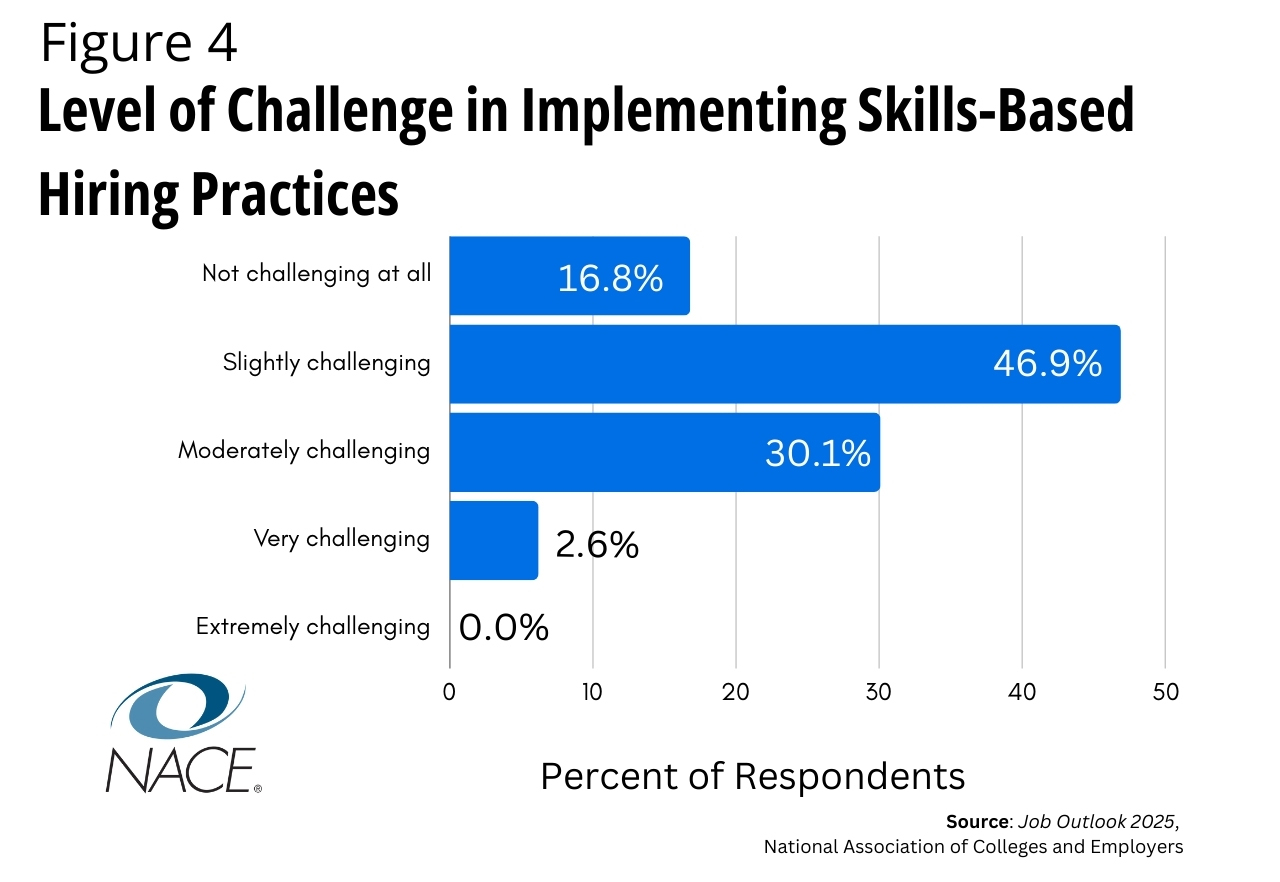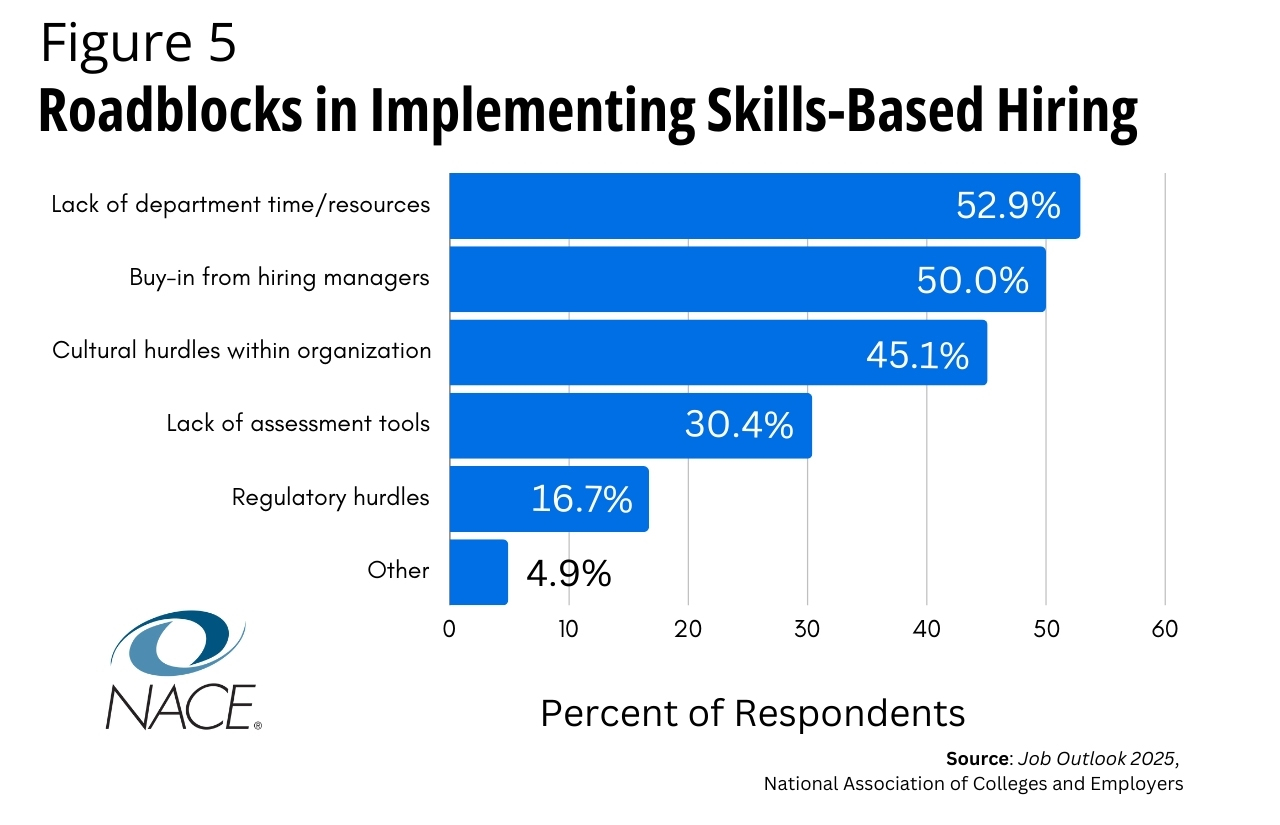For several years, NACE research has documented that employers have decreased their use of the GPA as a screening tool for new college graduate hires. In 2019, close to three-quarters of employers reported that they used GPA to filter job candidates. However, that proportion of employers steadily decreased to an all-time low of 37% in 2023. Our most recent data from Job Outlook 2025 bumps that percentage up a bit to 46%, but it is still well under 2019 numbers.
JOB OUTLOOK 2025 SLIDES
The Job Outlook 2025 report is presented in slide format; slides can be downloaded and used as is, or adapted with permission.View the slides
When asked what replaces the GPA, a candidate’s academic major tops the list, followed closely by an applicant’s demonstrated proficiency in competencies. It is also important to note that companies that do screen for GPA also report that a candidate’s proficiency in competencies is a factor they consider during the hiring process. How do employers screen college graduate candidates for skills as part of the hiring process? In this year’s Job Outlook survey, we included a series of questions to better understand the ways skills-based hiring is part of the landscape for recent college graduates.
To be clear, skills-based hiring is a framework that focuses on a job candidate’s specific skills and competencies for the job, focusing on the candidate’s abilities. In contrast, traditional hiring practices tend to forefront the candidate's educational attainment, experience, and background.
We found that close to two-thirds (64.8%) of employers surveyed reported that they use skills-based hiring practices for new entry-level hires. Further, skills-based hiring practices appear to be relatively pervasive, with more than half of employers using these practices always or most of the time in their hiring process. (See Figure 1.) Furthermore, as illustrated in Figure 2, there seem to be specific points in the hiring process when skills-based hiring predominates. Ninety percent of employers that use skills-based hiring report they use it at the interview point, and two-thirds of employers incorporate skills-based hiring in the screening process.


We further learned that there are different ways that employers put skills-based hiring into practice. Almost three-quarters of employers in our study report that they have developed competency-based job descriptions and more than half of employers use skills-based interview rubrics. Assessment tools also play a role, with close to 40% of employers using internally created tools, and one-quarter using externally created tools. Significantly fewer employers report using digital badging, micro-credentials and game-based assessments. (See Figure 3.)

Additionally, employers report using this practice to source candidates, in promotion processes and placement. A majority of employers found it relatively seamless to incorporate skills-based hiring with 64% of them reporting there were no or slight challenges experienced, although a modest number reported they experienced some challenges. (See Figure 4.) When asked about roadblocks to incorporating skills-based learning, resources and cultural change topped the list. Specifically, 53% of employers reported a lack of department time/resources to implement new hiring practices. Half of employers reported a lack of buy-in from hiring managers and 45% reported cultural hurdles within their organization. (See Figure 5.)


Our findings highlight that skills-based hiring is being incorporated into the recruitment of entry-level college graduates. This requires college graduates to be prepared to both articulate and demonstrate their competency proficiency in hiring materials, interviews, and other assessments. Central to this is the commitment from colleges to integrate career readiness and competencies throughout the students’ curricular and co-curricular experiences. Strategies to achieve this include:
- Institution-wide competency adoption and integration;
- Targeted engagement with employers;
- Competency alignment and assessment in activities inside and outside the classroom; and
- Opportunities for experiential and work-based learning.
Providing students with have opportunities to develop and express their skills and competencies during their college years will help prepare them to succeed in a hiring environment that is increasingly using skill-based hiring practices.
The Job Outlook survey is a forecast of hiring intentions of employers as they relate to new college graduates. Data for the Job Outlook 2025 survey were collected from August 5, 2024, through September 16, 2024. Of the 237 total respondents, 162 were NACE employer members, representing 19.2% of eligible member respondents. The Job Outlook 2025 survey was also distributed to nonmember companies, from which an additional 75 responses were received. Job Outlook 2025 is available on NACEWeb.





